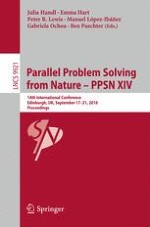2016 | OriginalPaper | Buchkapitel
k-Bit Mutation with Self-Adjusting k Outperforms Standard Bit Mutation
verfasst von : Benjamin Doerr, Carola Doerr, Jing Yang
Erschienen in: Parallel Problem Solving from Nature – PPSN XIV
Aktivieren Sie unsere intelligente Suche, um passende Fachinhalte oder Patente zu finden.
Wählen Sie Textabschnitte aus um mit Künstlicher Intelligenz passenden Patente zu finden. powered by
Markieren Sie Textabschnitte, um KI-gestützt weitere passende Inhalte zu finden. powered by
